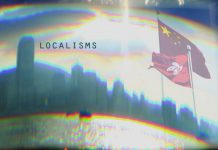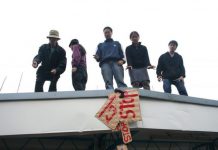Ma finds it ironic that Chu, Lau and Law are also called localists when in fact, they are often attacked by localists as “left plastic” or “leftards”, a derogatory term used to describe left-leaning individuals who believe in peaceful, rational protest. Ma says relative to the right-wing localists, the self-determination camp is left-wing, stresses the need for equality, upholds universal values and does not encourage discrimination against any groups in society.
While all the parties agree Hong Kong people should have the right to decide their future, they have different visions of how that should be achieved.
Founded in 2012, Civic Passion began to position itself as a localist party around a year later. Cheng Chung-tai, who now chairs the party, says Hong Kong’s distorted political situation – Beijing’s intervention and the deprivation of Hong Kong people’s rights – are what led to the rise of localism as a force.
During the legislative council election, CPR campaigned on a platform of extending the Basic Law in perpetuity, with Hong Kong people having the right to amend it through a de facto referendum, as a way to assert Hong Kong’s autonomy.
“Being able to amend the constitution implies that Hong Kong people are vested with their political autonomy,” says Cheng, who argues such an arrangement would give Hong Kong the de facto powers of an independent entity.
Cheng says Hong Kong cannot bear the consequence of a bloody revolution and that his party’s suggestion is more practical. There is nothing wrong with the nature and framework of the Basic Law, he says, the problem is its substance – such as Article 5, which states a 50 year limit on Hong Kong’s existing systems and way of life.
Critics have argued that despite their localist positions, Civic Passion’s acceptance of the Basic Law beyond 2047 implies acceptance of Chinese sovereignty.
“Does sustaining the Basic Law mean agreeing with Chinese sovereignty? Does drinking water from Dong Jiang River mean agreeing with Chinese sovereignty?” says Cheng, arguing this is not a valid discussion.
This puts him at odds with the post-Occupy Movement party, Demosisto, founded by former members of Scholarism and the Hong Kong Federation of Students.
“The Basic Law suppresses dissidents and is always being interpreted according to the mainland Chinese government’s will. I don’t understand why we should still sustain it,” says Joshua Wong Chi-fung, the secretary general of Demosisto.
Wong believes Hong Kong people should have the right to decide the city’s future. He says Hong Kong was cheated of the United Nations recognition of the right of former colonies to pursue self-determination after China lobbied for it to be removed from the list of colonies in 1972.
To achieve its goal of self-determination, Demosisto proposes a “Charter of Hong Kong” to introduce the establishment of a Referendum Law in Hong Kong. Wong says they want to work for a consensus in society and actively lobby international support. He says any referendum must have credibility at home and abroad, and should include different options on the future of Hong Kong, including independence and the current One-country, Two Systems model.
Demosisto describes their position as being one of democratic self-determination, and it is one which the other two newly elected independent Legislative Councilors Eddie Chu Hoi-dick and Lau Siu-lai also share. However, while Demosisto is more focused on political development, Chu and Lau place greater emphasis on social issues. Chu is focused on environmental, land and development issues whereas Lau focuses more on labour and welfare and the rights of the underprivileged.









































